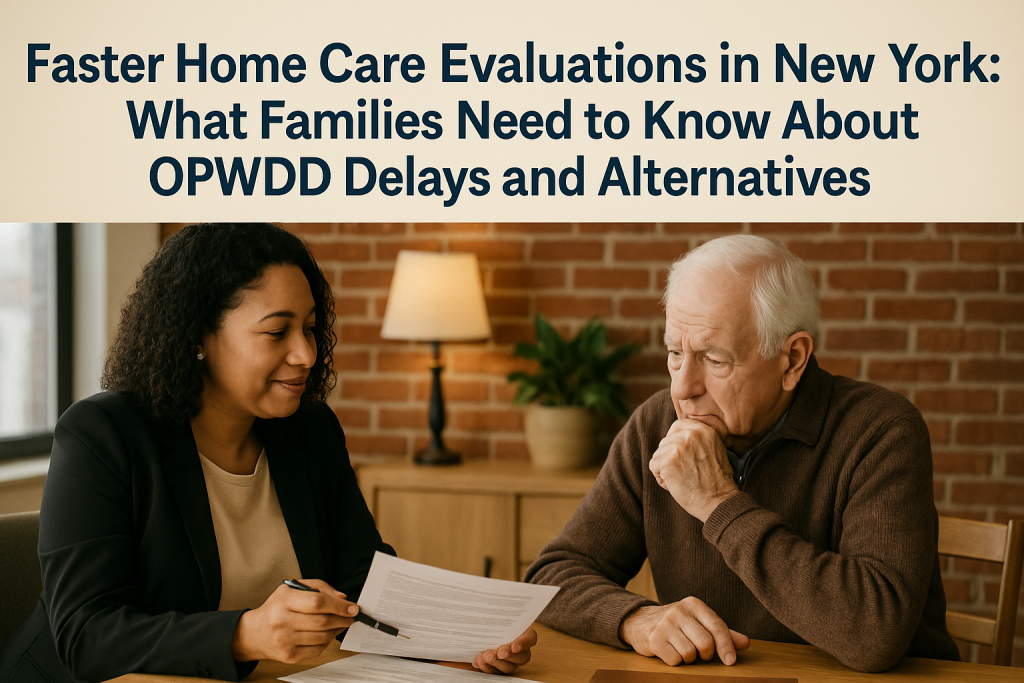Table of Content
1.When Time Becomes the Biggest Burden
2.Why the Delays Happen
3.The Human Cost of Waiting
4.What Families Often Don’t Hear
5.Why It Matters to Act Early
6.How SecureSafer Supports Families
7.Finding Hope Without False Promises
When Time Becomes the Biggest Burden
Imagine this: you’ve just been told your loved one qualifies for services through the Office for People With Developmental Disabilities (OPWDD). Relief washes over you—finally, some help is on the way. But then the waiting begins. Weeks turn into months, and each phone call ends with the same message: “We’re still processing.” Meanwhile, the care needs don’t wait.
For thousands of New York families, this is the reality. The evaluation process that is supposed to open the door to essential services often feels like a locked gate with no key in sight. Parents of children with autism, families caring for adults with disabilities, and seniors struggling with complex medical needs all face the same question: how long can we hold on without help?
Why the Delays Happen
The truth is, New York’s OPWDD system isn’t broken, but it is overburdened. The demand for evaluations continues to grow, while staffing at state-approved agencies lags far behind. Fewer coordinators are available to handle more applications than ever before. Add in paperwork backlogs, eligibility verifications, and an already stretched Medicaid system, and the result is predictable: families waiting month after month.
ADVERTISEMENT
According to the New York State Department of Health, workforce shortages remain one of the top reasons for slowdowns across Medicaid and home care programs. The shortage doesn’t just affect evaluations; it affects nearly every step of the process. That means even when approvals happen, services can take time to start.
The Human Cost of Waiting
Behind the statistics are families living on edge. A mother in Queens described how her son’s autism support plan stalled for nearly nine months. During that time, he missed therapies that could have helped him progress in school. In Brooklyn, a senior’s family reported paying out-of-pocket for private aides while waiting for approval—costs they could barely manage.
Delays aren’t just inconvenient. They stretch caregivers to their limits, financially and emotionally. Some parents reduce work hours or leave jobs entirely. Others burn through savings to cover short-term solutions. And for the individual needing care, every lost week can mean missed therapy sessions, unmanaged symptoms, or preventable hospital visits.
What Families Often Don’t Hear
What many families don’t realize is that while OPWDD is the official path for long-term developmental services, it isn’t the only doorway into home care support.
For older adults and individuals with chronic illnesses, New York’s Managed Long-Term Care (MLTC) programs may offer coverage while OPWDD decisions are pending. These plans are designed to help coordinate nursing, personal care, and home health services for those who qualify. Some families also find relief through Certified Home Health Agencies (CHHAs). These programs, overseen by the Department of Financial Services, can provide skilled nursing or therapy visits, particularly for those transitioning from hospital care back into the community. And for low-income adults under 65, the New York Essential Plan remains another possible safety net. While it isn’t a replacement for OPWDD, it does open access to health coverage and in certain cases, limited home health support.
In other words, waiting on OPWDD doesn’t always mean waiting without options.
Why It Matters to Act Early
Every week of delay adds to the risks families face. A 2023 Department of Health report noted that gaps in care often lead to worsening health conditions and higher Medicaid costs in the long run. Families who wait too long for evaluations sometimes encounter crises that could have been avoided—emergency hospitalizations, caregiver burnout, or children losing progress in therapies.
Understanding the alternatives isn’t just about convenience. It’s about prevention. It’s about protecting a loved one’s health and stability during the waiting game.
How SecureSafer Supports Families
At SecureSafer, we’ve seen these struggles firsthand. Families come to us exhausted from repeating the same story to different agencies and still getting no answers. Our role is not to make promises or guarantee approvals—that wouldn’t be ethical, or compliant with state rules. But what we can do is guide families through the maze.
We help parents and caregivers understand where they may have overlapping eligibility, whether it’s through MLTC, CHHAs, or other Medicaid-managed programs. We assist in completing paperwork in a way that reduces errors that cause delays. And most importantly, we stand beside families during a process that often feels overwhelming and lonely.
ADVERTISEMENT
One Brooklyn family told us that simply knowing there were alternative programs gave them hope. While their OPWDD evaluation was still pending, they were able to enroll their elderly parent in an MLTC program, which ensured that at least some home care hours were covered. It didn’t solve everything, but it made the waiting less painful.
Finding Hope Without False Promises
The bottom line is this: OPWDD evaluations in New York are slow right now, and families should prepare for delays. But waiting doesn’t mean standing still. By exploring Medicaid’s other pathways, asking the right questions, and seeking informed guidance, it’s possible to ease some of the burden while the official process catches up.
If you’re caring for a loved one and stuck in the evaluation backlog, know this—you’re not alone, and you’re not without options.
Compliance Note
This article is for informational purposes only. It does not guarantee benefit approvals, financial savings, or eligibility. All program information is based on publicly available resources, including medicare.gov, dfs.ny.gov, and health.ny.gov. Families should confirm eligibility directly with official state or federal agencies.
| Need Help Now? Don’t Wait. ✅ Call our SecureSafer team directly at SecureSafer.com or call (646) 444-2020 ✅ Request a policy review or switch evaluation today. |
ADVERTISEMENT

